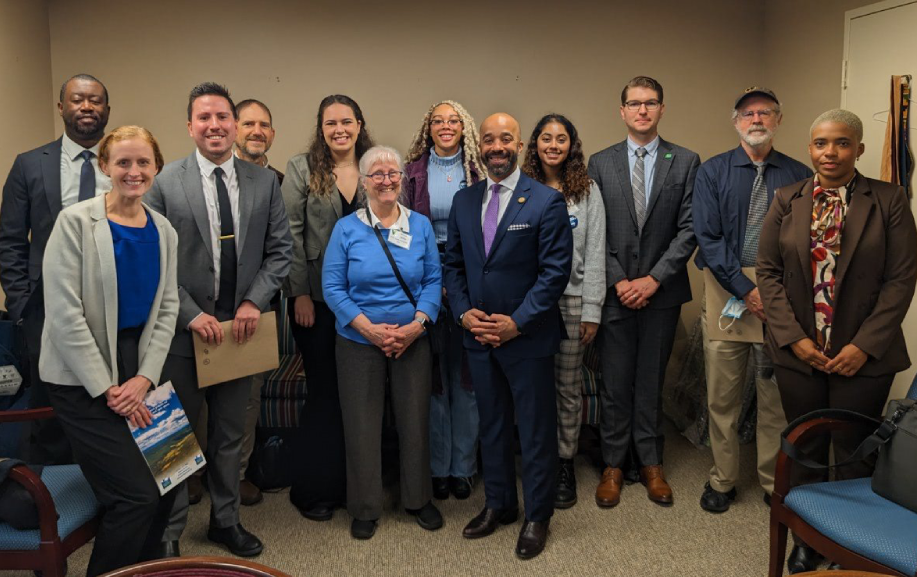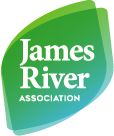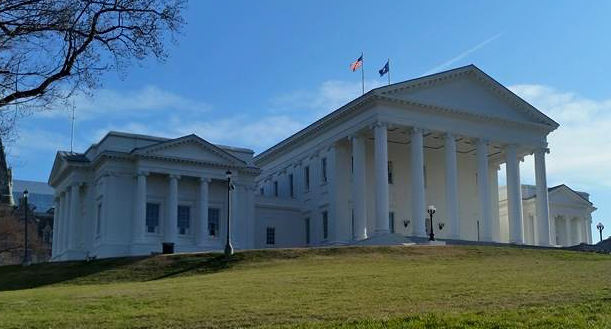The 2023 General Assembly session is now over, and legislation is on its way to the Governor’s desk as we write these words. The final state budget is still to come, but the hustle and bustle of the General Assembly has wound down. Now is a great time to give an update on where things stand on clean water legislation in 2023!
Additionally, as the James River Association navigated the ebbs and flows of the General Assembly session this year, we also managed a transition within our advocacy team. Our Director of Advocacy, Anna Killius, recently moved into a new role supporting clean water as the Executive Director of the Chesapeake Bay Commission (Congratulations, Anna!). Tom Dunlap, JRA’s new James Riverkeeper, stepped forward to keep up with items at the state capital in her stead.

Photo with Delegate Jeff Bourne, courtesy of Virginia Conservation Network.
Clean Water Legislation Spotlight:
- House Bill 1839/Senate Bill 963: South Central Wastewater Authority (SCWWA) Permit for Nutrients – This legislation establishes an extended timeline for facility upgrades that will keep water quality improvements on track at the the SCWWA – a wastewater treatment facility that serves Chesterfield, Dinwiddie, Prince George, and the Cities of Colonial Heights and Petersburg. The upgrades will prevent additional nutrients from entering the James.
- Senate Bill 1129: Chesapeake Bay Deadlines for Cattle Exclusion and Nutrient Management – This bill will provide a narrow extension from 2025 to 2028 on deadlines for specific agricultural best management practices, including cattle exclusion from rivers and streams. This bill was vigilantly negotiated by members of the agricultural community and environmental groups, striving to ensure that Virginia’s farmers are in a suitable position to succeed in achieving the agriculture sector’s Chesapeake Bay Watershed Implementation Plan goals in a timely fashion. JRA, along with many of the parties involved in the effort to amend this legislation, will participate in a stakeholder advisory group to assess progress in meeting these goals over the coming years.
- House Bill 2209: High Polycyclic Aromatic Hydrocarbons (PAH) Pavement Sealant Local Option – This bill was narrowly defeated in the House on a vote of 47Y-50N. The bill would have provided localities with the ability to ban certain pavement sealants that are high in polycyclic aromatic hydrocarbons, which are known cancer-causing agents in humans and aquatic organisms. While it was defeated this session, we are hopeful that the support garnered, and constructive conversation that entailed, will provide the boost it needs to prevail in the future.
Natural Resources Budget and Amendments
As the final budget continues to take shape, there are multiple budget amendments for necessary programs and operations to improve water quality all over Virginia that we are optimistic will make the final cut – including over $12 million in additional funding to incentivize high-return agricultural BMP implementation on farms; $500,000 to accelerate achievement of Virginia’s Tree Canopy Chesapeake Bay WIP goals; and essential investments in the Stormwater Local Assistance Fund. These proposed allocations, on top of the historic investments in natural resources realized in the proposed 2023-2024 budget -including record funding for the Virginia Agricultural Cost Share Program and substantial funding for wastewater treatment upgrades- represent tremendous steps towards Virginia’s commitments to the James River and the Chesapeake Bay cleanup effort!
That’s it for now!
We appreciate your continued support and look forward to providing more updates from the Advocacy team throughout the year.
Help strengthen the voice for the river by joining our Action Network. We’ll keep you up to date on the latest river policy issues and connect you to your elected officials so you can let them know that water quality is important to you.

